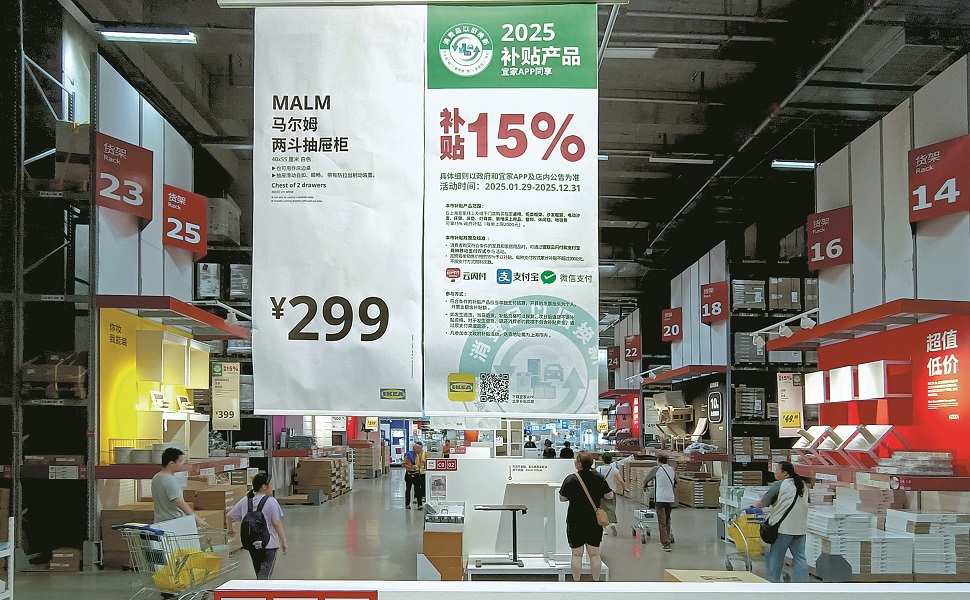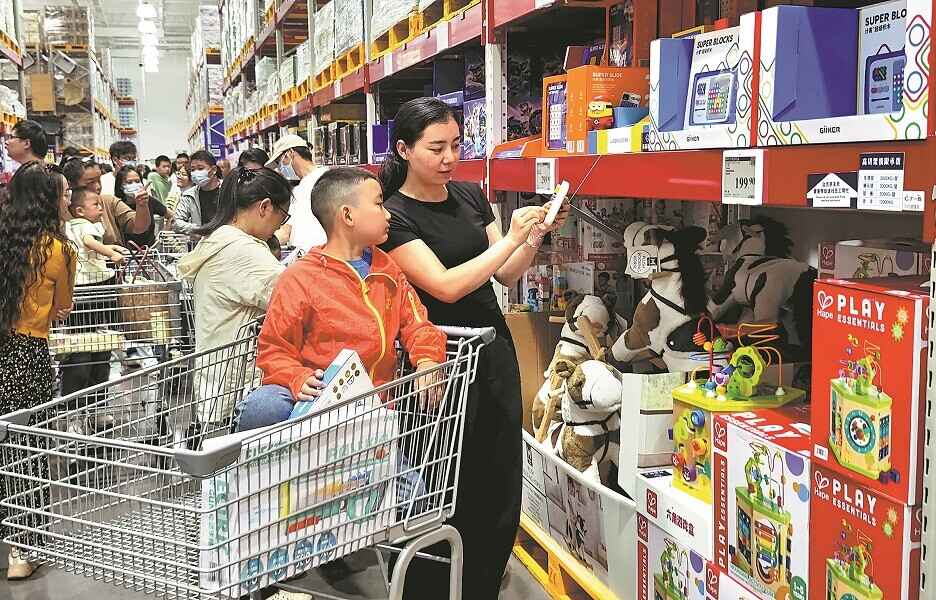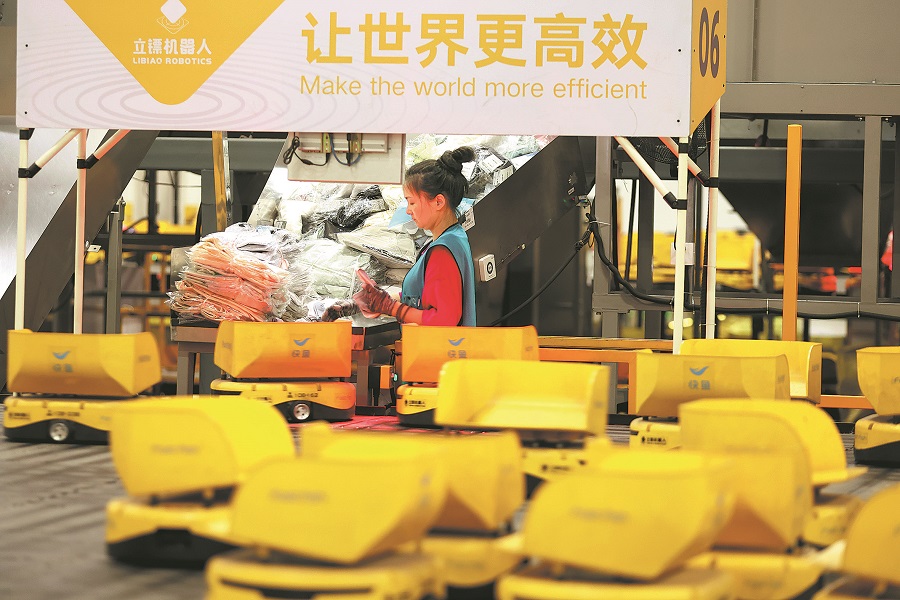
From the comfort of her sofa, Kristen Hayden recently bought a new air conditioner and some outdoor sporting products on Chinese e-commerce platforms.
"My friends can't stop talking about the '618' shopping spree. There are some pretty decent discounts if you can catch them in time," said Hayden, who is from the United States and works for a multinational company in Guangzhou, Guangdong province.
"My favorite way to shop is lounging on the couch, scrolling through Taobao on my phone, and adding things to my shopping cart," she added.
Hayden said she was excited to snap up discounted items that she had been eager to purchase without spending too much money during the midyear promotional event. With shopping coupons, she enjoyed a discount of about 20 percent.
China's fast delivery services also impressed her. Most of the goods she ordered were delivered to her doorstep a day later. "It is quite convenient," she said.
Like Hayden, a large number of consumers at home and abroad have swarmed to Chinese online marketplaces to buy bargains during this year's "618" shopping carnival, which began in mid-May and culminates on June 18 (Wednesday). Home appliances and premium smart electronic products are among the most popular items this year, retailers said.
In order to attract more overseas consumers, Alibaba's e-commerce platform Taobao announced its free global delivery service will be expanded to 12 countries and regions during the promotional event.
Jimmy Perez, a university student in Sydney, Australia, said he loves to buy China-made goods directly because of their comparative affordability.
"I have downloaded Taobao and JD, and my mind has been opened, (there are) so many good things when I browse the apps," he said.
A juice extractor usually sells for more than 60 Australian dollars ($39.12) in Sydney, but he bought one for $28 via Taobao during the midyear promotional gala. "The money I saved is enough to buy a new one for a friend," he said.

Surging sales
Major e-commerce platforms have increased their efforts this year to attract price-conscious shoppers amid the country's drive to boost consumption, which includes the expansion of the consumer goods trade-in program.
While final sales figures are not yet in, there are early indications that this year's 618 festival will deliver a big bump to consumption and the domestic economy.
In the first hour of the festival, which started at 8 pm on May 16, sales of 43 brands surpassed 100 million yuan ($13.9 million), data from Tmall, Alibaba's business-to-customer platform, showed. More than 13,000 brands saw their sales double during this brief period.
Within just 20 minutes of the shopping gala's start, turnover of Apple products on the platform exceeded that of the entire opening day last year, fueled by subsidies provided by the government and the platform.
As of May 30, a total of 217 brands had seen their festival sales exceed 100 million yuan, Tmall said.
The turnover of home appliances, mobile phones and digital products participating in the trade-in program had increased 283 percent compared with last November's Singles' Day festival, another massive shopping promotion.
The overall sales of home appliances, home furnishings and decorations, and electronic gadgets, registered double-digit year-on-year growth for the period to May 30, Tmall said.
The transaction volume of Apple, Xiaomi, Midea, Huawei and Haier each surpassed 100 million yuan within the first hour of the promotion, while the sales of more than 10,000 popular electronic devices such as gaming laptops, high-end earphones and intelligent robots skyrocketed over tenfold year-on-year.

Top priority
This year's Government Work Report listed boosting consumption and expanding domestic demand as a top priority for 2025.
In January, a raft of measures was announced to expand the scope of the consumer goods trade-in program. They included increasing funding from 150 billion yuan last year to 300 billion yuan this year, and expanding government subsidies for categories of home appliances and electronic products such as smartphones, tablets, smartwatches and wristbands.
Denis Cheng, consumer sector leader of EY Greater China, said the trade-in program had reduced costs for consumers purchasing new products of better quality and higher performance.
This updated program will also help improve the service quality of e-commerce platforms and boost the development of related industrial chains, including those involved in the recycling, dismantling and reusing of products, Cheng said.
Jason Yu, general manager of CTR Market Research, said the expansion of the trade-in program had motivated consumers to shop, and pushed up the sales of electronic devices and home appliances on online marketplaces.
The popularity of high-end, intelligent and energy-saving commodities had not only increased, but also boosted people's quality of life, he said.
Online retailers simplified promotional methods during the 618 festival to improve consumers' shopping experience. Chinese shoppers attach great importance to the quality of a product as well as its value, and are inclined to purchase premium items that are cost-effective, Yu said.
"It is noteworthy that e-commerce players have stepped up support for small and medium-sized merchants during the online shopping festival," he added.
Against the backdrop of tariff increases from the United States, steps have been taken to help the country's exporters sell their products at home to relieve pressure on exports, Yu added.
Wang Yun, a researcher at the Chinese Academy of Macroeconomic Research, said consumption has become the main driving force of China's economic growth.
"The 618 online shopping extravaganza is vital for unleashing consumers' purchasing potential, bolstering domestic demand and shoring up the economy amid external uncertainties," Wang said.
Mo Daiqing, a senior analyst at the Internet Economy Institute, a domestic consultancy, said while Chinese consumers' enthusiasm for the 618 festival is unlikely to wane, work still needs to be done by e-commerce platforms. Mo suggested they improve supply chains and logistics networks, optimize operational models, and offer customized goods and services in accordance with different groups' demands, while undertaking brand upgrading and product innovation.
China's retail sales, a significant indicator of consumption strength, rose 4.7 percent year-on-year during the January to April period, accelerating from 4.6 percent growth recorded in the first quarter, according to National Bureau of Statistics data. Online sales remained a bright spot, rising 7.7 percent year-on-year in the first four months.
Last year, the final consumption expenditure contributed 44.5 percent to the nation's GDP growth — surpassing investment and exports — and drove a 2.2 percentage point increase in GDP, said the NBS.
Yu, from CTR Market Research, said he is confident that the country's consumer market is poised for steady growth this year, driven by supportive measures to boost consumption.

Global expansion
Consumers from countries and regions including Singapore, Malaysia, South Korea, Australia, Japan, Thailand, Cambodia, Kazakhstan and Mongolia were able to enjoy free delivery services during the festival when their purchases reached a certain amount, Taobao said.
It was the first time that Kazakhstan and Mongolia were included in Taobao's free-shipping zone.
Customers in these countries and regions could enjoy steep discounts and direct price cuts similar to domestic shoppers. They could also access convenient return services, which allowed shoppers to return unwanted items at nearby collection points. Taobao said it would accelerate steps to expand its presence in overseas markets this year, and support merchants wanting to explore international markets and achieve business growth.
JD recently announced that users across 17 markets — including Japan, South Korea, Singapore, Thailand, Malaysia, Vietnam, Cambodia, Australia and New Zealand — can enjoy free-shipping promotions.
The platform has optimized its direct-mail logistics network, which now covers 37 countries and regions, while reducing shipping costs in Southeast Asia by 30 to 50 percent. These improvements ensure faster, more affordable delivery for global consumers, it said.
Overseas consumers can buy products from categories such as beauty goods, home appliances, furniture, and consumer electronics and receive the same value, quality, and service as domestic shoppers, JD said.
"The expansion of the global free-shipping zone will let overseas consumers enjoy high-quality and cost-effective China-made commodities, bolster the development of international trade and improve the competitiveness of Chinese online retailers in the global e-commerce landscape," said Hong Yong, an associate research fellow at the Chinese Academy of International Trade and Economic Cooperation.
The expansion will not only help e-commerce players rapidly expand their footprint in overseas markets and shorten the cross-border delivery times, but also allow international shoppers to engage in cross-border shopping more effectively, Hong said.
However, Chinese e-commerce enterprises are facing some challenges in overseas expansion, he said, including an increasingly complex international trade environment and cultural differences. Hong suggested they develop a deep understanding of local consumer habits, and relevant laws and regulations in targeted markets, and build highly efficient and reliable cross-border logistics networks.
Cheng, from EY Greater China, said the expansion of free cross-border shipping will reinforce the awareness and influence of Chinese brands in the international market and promote the development of China's cross-border e-commerce sector.
He called for the platforms to boost logistics capabilities, improve after-sales services, step up technical R&D and innovation, and optimize supply chain management to enhance their competitiveness on the global stage.
Jiang Han, a senior analyst at market consultancy Pangoal, said the expanded free delivery measures will greatly appeal to price-sensitive consumers.
"It is noteworthy that the expansion plan includes Kazakhstan and Mongolia, which indicates that the e-commerce platform is exploring more opportunities in emerging markets, and will enable merchants to reach potential overseas customers, thus propelling the robust growth of cross-border trade," Jiang said.
To make inroads into overseas e-commerce markets, Chinese online retailers should adjust product strategies and service models in accordance with the demands of various countries and regions, and strengthen the establishment of compliance systems in overseas markets, he added.
















